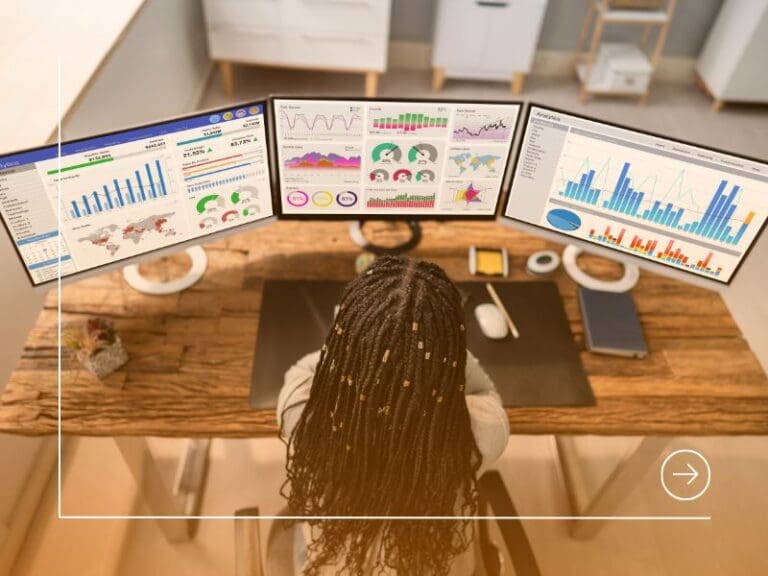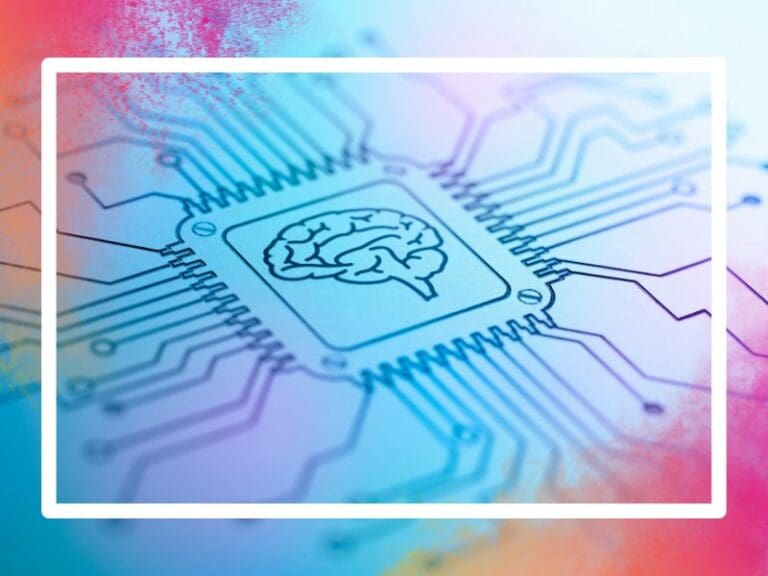Bumble’s mission is to create a world where all relationships are healthy and equitable. With millions of members, the requirements for Data Science are plentiful, diverse, and constantly evolving – while opportunities for making real-life impact are endless.
Find out directly from 4 women in Data Science at Bumble what their roles involve, how they develop their skills and career, and some of the resources they use.
Meet Teresa Bono: Senior Data Scientist
“What is an average day in your role at Bumble like?”
Most of my days are spent coding. I also have stand-ups with my team a few times a week, where we keep each other updated and problem solve together. I have recurring meetings with users of deployed models to make sure things are running smoothly and business partners for new models, to discuss requirements and progress. Since we mostly work remotely, I also like to have catch-ups with other Bumble teammates. Though when possible, we try to have those in person, either in the office or at the local pub, much like the collaborative spirit found among the 5 Female Researchers Shaping the Future of Computer Science.
“Why do you think a background in economics is valuable for a role in data science?”
Economics gives very good maths and stats foundations, which are key in data science. Being familiar with the mathematical foundations of things like regression analysis is definitely helpful to pick up new methods and learn how to use them correctly.
More unique to economics, I think some of the most interesting questions in data science are really about ‘how’ things happen. Causal inference methods and, more generally, the focus on causality, which is quite central to a lot of economics and econometrics, give great tools to answer these types of questions.
Finally, economics gives a structured way to think about social interactions, incentives and market dynamics. Most companies, Bumble included, grapple with these dynamics constantly, so being able to add this lens to my work is useful.
“How do you see the role and impact of data science in Bumble?”
Data scientists at Bumble work across all three of Bumble’s core goals: member safety, member experience and revenue. So I’d say our impact is quite wide ranging, and the projects we work on varied. We partner quite closely with business teams, from gathering requirements to showing progress early on in the development phase, to ensure that what we develop is tailored to each specific use case. This helps ensure that we bring the most value to the business. It also allows us to work with our super creative colleagues from other parts of the business.
Meet Laura Mitchell: Lead Machine Learning Scientist
“What skills and traits do you look for when hiring for your team?”
There are a number of qualities I look for when holding interviews. Aside from technical capabilities, some of the core competencies that are important are communication, a positive attitude, teamwork, collaboration, flexibility, and a willingness to learn. At Bumble, members of the team are expected to support one another and be collaborative so that we are able to grow as a whole rather than as one. It’s also important to be able to take feedback in a constructive way as it is an effective way of learning and developing as an individual. We are essentially looking for people who are very much aligned with our Bumble values; growth, Make the First Move, honesty, kindness, accountability, inclusivity.
Technically speaking, the team primarily works with Python on a day-to-day basis so strengths here are very important. Solid knowledge of statistical and machine learning theory concepts are also required. In addition, we are looking for people who have practical hands-on experience with machine learning which has demonstrable business impact.
“What is an average day in your role at Bumble like?”
For me, no two days at Bumble are the same! In general, it’s a mix of hands-on people management, admin, recruitment, project reviews. Some of my core people management responsibilities are to provide support and growth opportunities for people in the team, along with driving recruitment efforts. As a result, I often have meetings with members of the team for general 1:1 catch-ups, working to set and evaluate individual level and team goals, support with removing roadblocks along with holding interviews and meetings related to recruitment. Aside from direct line management responsibilities, I am often working with other members of the Data Science leadership team and stakeholders to define our vision and strategy, project planning, managing stakeholders and so on. As a result, I have many people across the business that I collaborate with.
“How have you found the career development opportunities at Bumble?”
In my experience at Bumble, people are given the autonomy to be the driver of their own success. Managers within our department work together with individuals to map out their career paths and work together to help people achieve their goals which gives many possibilities for people to progress in the direction that best suits their aspirations.
My own journey at Bumble began as a Data Scientist. As I developed my skills and took on more responsibilities, I was promoted to Senior Data Scientist. From there I moved into a people management position where I was given a lot of responsibility and autonomy. My mission is to scale the team and onboard talented people who have a passion for our product. In my current role, I am very proud to work with such driven and intelligent people who take pride in delivering top quality work while having fun along the way!
Meet Daphne Gavezou-Castro: Data Scientist
“What is an average day in your role at Bumble like?”
I am part of the User Experience team and a big part of what we do is work towards having a great recommender system so that each user is able to find relevant matches. Usually, my day starts with a check-in meeting with the rest of the team where we share what we have been working on and whether any of us has any blockers. Our work tends to be very collaborative and often cross-functional which is great. The type of projects I work on vary from doing analysis on experiments where we test changes to the recommendation algorithm, to researching what characteristics make certain profiles more relevant to our users.
“What impact does your work have in the business?”
My work ultimately contributes towards helping the Bumble community find who they are looking for. I contribute towards that by finding the most suitable metrics with which to measure whether we are on our way to achieving that goal. By analysing experiments that we run, I am able to advise on whether certain changes improve our predefined metrics or not. I also think about the bigger picture on how to improve our relevance algorithm alongside my team. We do this either by researching what other data points we can incorporate or by making sure our data is inclusive and comprehensive so it performs the best it can for everyone.
“Which tools/resources/networks do you find valuable for upskilling?”
I have found courses on Udemy to be very useful for improving technical skills. Medium articles are also really good for finding out what approaches others took to solving problems. It’s also very useful just speaking to other colleagues and finding out what they are really good at so that I can learn from them. Everyone is best at something, so knowing who is best to go to for the particular thing you need help with is very valuable.
Pair programming has been a tremendous help for me when tackling coding tasks that were new to me and/or felt quite intimidating to tackle by myself. I think after spending time doing some courses and practising by yourself, pair programming can take you to the next level faster.
Meet Maggie Wang: Machine Learning Scientist
“How would you describe your role at Bumble?”
I’d like to think of my role as both supportive and leading.
As a machine learning scientist focusing on developing models, I’m supporting other teams to better utilise data and make data-driven decisions. At the same time, the automated decision making helps users have a better experience on Bumble. I also take part in and often lead some of the discussions around research focused projects. These aim to look at longer term potential impact. The research topics can be expanding on existing work or exploring a new area.
In short, it is a privilege to be able to work with a variety of data, stakeholders and technical challenges.
“Which tools/resources/networks do you find valuable for upskilling?”
Other than the very common resources out there, like Udemy, Coursera, GitHub, YouTube etc., I’d suggest getting involved in the open-source community in areas where you’d like to further develop. I personally find it most useful when learning by doing.
A lot of the time, there are Slack channels for these communities. Sometimes you’d be surprised how easy it is to find people who are experts in the area you’re interested in and pick their brain on various technical topics. What you often find is that people involved in these communities are self-driven; naturally they tend to be very collaborative and helpful.
“How are you able to thrive as a data scientist at Bumble?”
I focus on the skill sets that I can bring to the table and areas that I need to work on. Working in a technical role myself, one of my priorities is to stay on top of my technical skills. I like to check in with myself and my manager that I’m working on projects that are best suited for my technical skills and interests.
In addition, I firmly believe in collaboration rather than competition. This means that I can seek support in areas where I’m lacking and provide value where my skill sets can contribute. As data scientists in Bumble, we’re working with various teams and stakeholders so improving communication skills can reduce friction when working with others.
Learning to work with my strengths and learning to leverage the skills of people around me has helped me a great deal.








